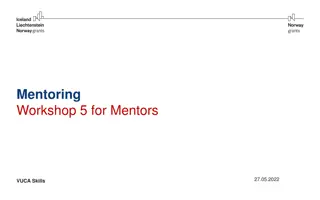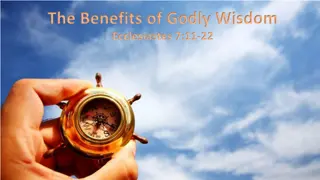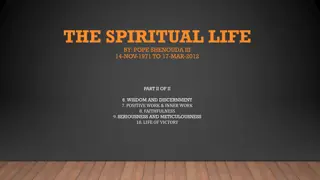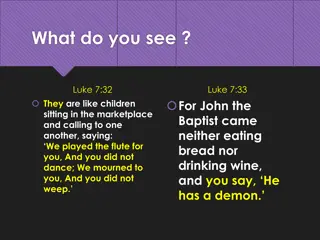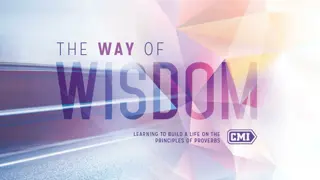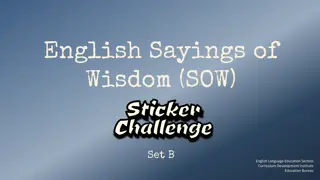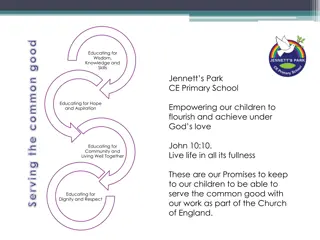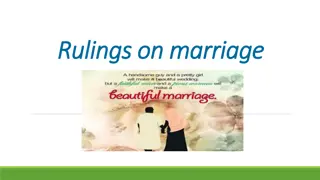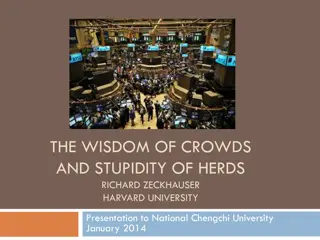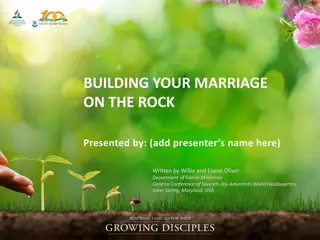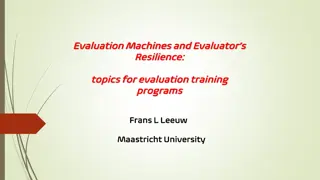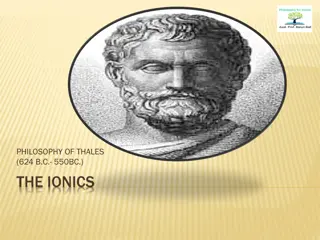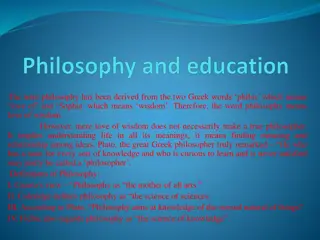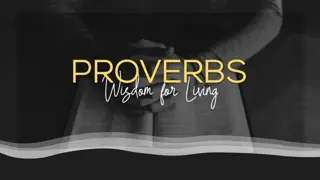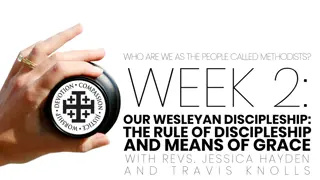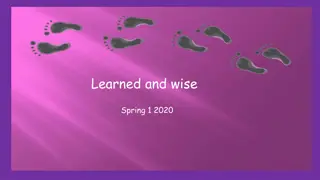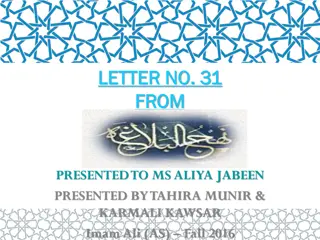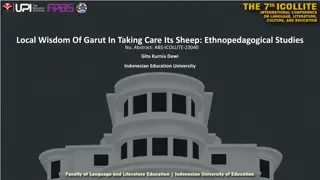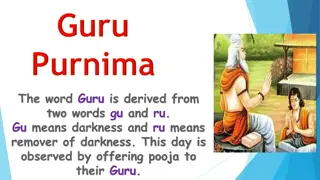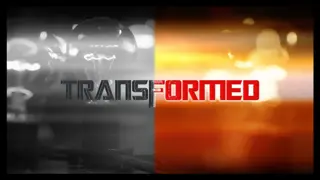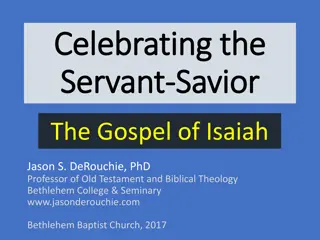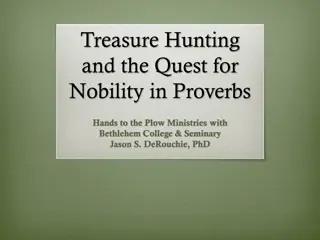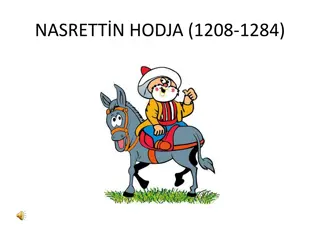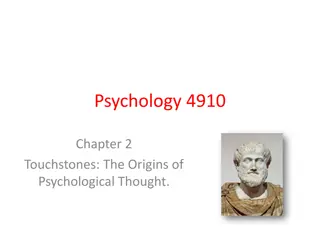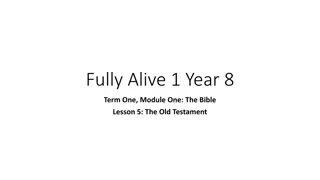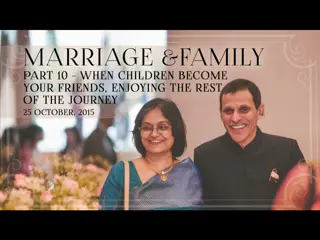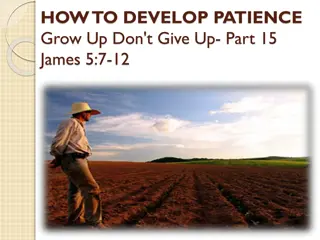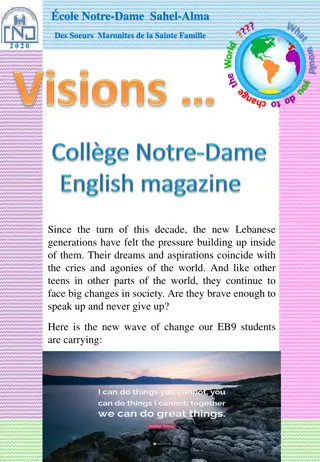Building Wisdom: Strategies to Navigate VUCA Challenges
Explore the concept of wisdom as a tool to solve problems and cure VUCA (Volatility, Uncertainty, Complexity, Ambiguity) based on medical research. Learn to develop essential competencies like empathy, emotional balance, and knowledge to handle life's uncertainties effectively. Discover the importance of finding a balance between stability and volatility in order to thrive in today's complex world.
Download Presentation

Please find below an Image/Link to download the presentation.
The content on the website is provided AS IS for your information and personal use only. It may not be sold, licensed, or shared on other websites without obtaining consent from the author. Download presentation by click this link. If you encounter any issues during the download, it is possible that the publisher has removed the file from their server.
E N D
Presentation Transcript
Wisdom: how to solve problems and to cure VUCA Thomas Walenta November 2021 based on: medical research published in Berlin, Charite hospital Kai Baumann, Michael Linden: Weisheitskompetenzen & Weisheitstherapie, Pabst Science Publishers 2008 1
Why this topic - Who am I? 1st project 1974, 1st PMO 1995, 1st program 2001, 31 years @ IBM, PMI Fellow, PMP, PgMP - What will you learn? what is wisdom, how to build it, where do you stand Wisdom cures VUCA - Why should you learn it? improve your capability to handle life and projects 2
Do you Do you remember remember FUD FUD? ? Fear, Uncertainty, Doubt Term coined by Gene Amdahl after leaving IBM 50 years ago marketing strategy to instill FUD about a competitor also used in politics emotions are bad advisors! 3
Is VUCA the new FUD? volatility The VUCA world ambiguity uncertainty complexity Is VUCA real? 4
Opposite of the VUCA perception stability SC vs VUCA clarity certainty simplicity Is this better? Do we need both views? 5
Positive feelings facing VUCA: thrill volatility choices curious The VUCA world ambiguity uncertainty exploring complexity Who tells you VUCA is bad? Why? FUD? 6
Find the balance VUCA - day - antifragile - strive SC - night - resilient - survive Balance Our own choice WISDOM Volatility Stability Certainty Uncertainty Simplicity Complexity Clarity Ambiguity It s your conscious choice
10 Competencies from medical research 1. changing perspectives 2. empathy 10. self distance 3. awareness & acceptance of own emotions 9. uncertainty tolerance Wisdom: 10 competencies to build & maintain 4. emotional balance, serenity 8. oriented towards sustainability 5. knowledge about facts & problem solving 7. relativism for values 6. contextualism How to improve? 8
Wisdom roots deep. Wisdom defined: Wikipedia: .. ability to contemplate and act using knowledge, experience, understanding, common sense and insight. Baltes: .. Expert Knowledge concerning the fundamental pragmatics of life. (make sense of life) It s the fundamental pragmatics of life. 9
1. Competence to change perspectives gain experiences that show that other s views can be a solution to my problems ability to see a situation from another s view examples: Salomonic solutions, Gordic knot, paradox intention, glass is half full, think outside the box how to improve: change roles (role play, actor), try seven hats (deBono), always look for alternatives, design thinking, walk in the other s shoes, focus outside .. https://youtu.be/eukpuF9Nt8k 10
2. Competence empathy emotional competence to understand the other s feelings examples: feel touched, feel (un)fairness or (dis)respect how to improve: focus from inside to outside, active listening, watching, interacting, networking 12
3. Competence to be aware of and accept own emotions emotional competence to feel and differentiate one s own emotional states self awareness and then being able to accept them (even if they are negative) leads to confidence and authenticity examples: grief joy, crying in a movie, laughing, excitement how to learn: name your feelings, feel them deeply, identify the triggers, JoHaRi Window 14
4. Competence to balance emotions, serenity, self-control peacefulness, staying quiet, patience, balance control visibility of own emotions to others enables distance to triggers and freedom to act examples: poker face, amplification, masking, humor, self-irony how to learn: meditation, being centered, mindfulness, know your triggers, get feedback, have a mentor, minimize blind spots 16
Self-Control: Crucial Conversations (Grenny et al.) Understand (and mitigate) automatic emotional reactions engrained in our brain diversity curiosity culture habit experience learned beliefs perception values Make sense, tell yourself a story Trigger, see & hear incomplete judgement, feeling (re-)act question to triggerer (more data?) question to yourself (is this the right story?) 17
5. Knowledge about facts & problem solving knowledge to survive and to strive assimilation: apply known schemes to situations > heuristic intelligence, facts WHAT accommodation: find unknown schemes > epistemic intelligence, know strategies to solve problems HOW examples: Delphi Oracle, Mentor, Nestor how to learn: read, listen, connect, play (experiment) and exercise 18
6. Contextualism events and perceptions depend on context classify events & perceptions based on situation, timeline/history and social relevance enables to take another perspective systems thinking examples: stakeholder analysis, design thinking, networking, exploring how to learn: practice convex/divergent thinking, de-focus, widen your viewpoint, ask others, get a mentor 19
7. Relativism for values / tolerance for pluralism (diversity) accept the value system of others while preserving your own perspective respect other opinions without seeing them as an attack to our own in contrast to rigidity and mono-causality examples: there are many truths (non monism), democracy, integration - not assimilation - of immigrants, learn Ubuntu (I am because you are) how to learn: delay responses, ask for reasons, travel the world, read about other cultures, be open for strangers, get close to universal human values 20
Ethical values describe triggers to our emotions 8 human values found in most human cultures (Rushworth Kidder) Responsibility, accountability Respect, mindfulness, tolerance, diversity PMI Code of Ethics and Professional Responsibility Fairness, justice, equitable Honesty, truth, integrity Freedom, autonomy Community, family, relatedness Compassion, Care, Love Compassion, care, love, help Humility, reverence for life 21
Global cultural system a model to understand others (based on A World of Three Cultures: Honor, Achievement and Joy by Miguel E. Bas ez) 3 hyper cultures Achievement Joy Honor Roman law, industrial Common/case law, post- WWII Islamic law, pre-industrial Legal system, historic context Typical behaviors Punctuality / efficiency, rationality, job > family Family / friendship, learning, sense of agency Respect for tradition / authority, patriarchy, family > job Hard work reward / punishment (economic harmony vs mastery) Trust / family (social autonomy vs embeddedness) Autonomy vs obedience (political hierarchy vs egalitarism) Key dominant values Protestantism, Judaism, Confucianism Catholicism, Buddhism Islam, Christian orthodoxy, Hinduism 8 macro cultures Main religions Western Europe, US, China, Japan, Sweden, Norway Latin America, European Catholics, Italy, Spain Islamic countries, India, Zimbabwe, Pakistan 200 mezzo cultures Nationality Ghana 97/101 Germany 9/101 Ghana 86/100 Germany 35/100 Ghana 5/101 Germany 93/101 800 micro cultures Language
8. Oriented towards sustainability (will power) ability to delay gratification pursue and reflect long-term goals understand different consequences of decisions examples: marsh-mellow test, Hofstede s long-term-orientation in cultures how to learn: look at positive/negative and short/long term consequences of any decision, be patient, set mid/long term goals, self- control https://youtu.be/Yo4WF3cSd9Q 23
9. Uncertainty Tolerance Life comes with (is) uncertainty accept that no result is 100% predictable or controllable Panta Rhei (everything is in flow, Heraklit) example: swim in river, bungee jumping, start a project how to learn: prepare for multiple outcomes (strategize), recognize positive surprises, ask what if.. questions 24
10. Self distance, humility Accept there are higher goals than your own well-being Accept that you are not the center of the universe opposites: narcissism, envy, bragging, pride, greed be a giver, not a taker (see Adam Grant) examples: I know that I know nothing (Socrates) how to learn: focus on others, be self-aware 25
Emotional Intelligence a base for wisdom and leadership 4. Competence to balance emotions, serenity, self-control 3. Competence to be aware of and accept own emotions me self awareness: confidence, authenticity self control: mindfulness, resilience compassion: self-motivation, flow observe act Stakeholder Management empathy: influence: learning, understanding, listen organizational awareness leadership, impact, conflict handling, negotiations you 2. Competence empathy
Improve competencies to increase your Wisdom level. 1. changing perspectives 10. self distance 2. empathy 3. awareness & acceptance of own emotions 9. uncertainty tolerance Wisdom: know how to live 8. oriented towards sustainability 4. emotional balance, serenity 5. knowledge about facts & problem solving 7. relativism for values 6. contextualism 27
Know yourself better. Competence level Competency 1 changing perspectives 2 empathy 3 self-awareness 4 serenity, balance beginner some balanced much expert 5 knowledge: facts & strategy 6 context 7 value relativism 8 sustainability, long term 9 uncertainty tolerance 10 self distance Start improving 3 wisdom competencies.
menti.com 8890 4588 29
Wisdom helps balance VUCA and SC 1. changing perspectives 10. self distance 2. empathy 3. awareness & acceptance of own emotions 9. uncertainty tolerance Volatility Stability 8. oriented towards sustainability 4. emotional balance, serenity Uncertainty Certainty 5. knowledge about facts & problem solving 7. relativism for values Complexity Simplicity 6. contextualism Ambiguity Clarity Creating your own balance of perceptions
Now - go and become wiser, master your life better, improve society and the world, and do not fear VUCA but embrace it.
menti.com 5065 4496


